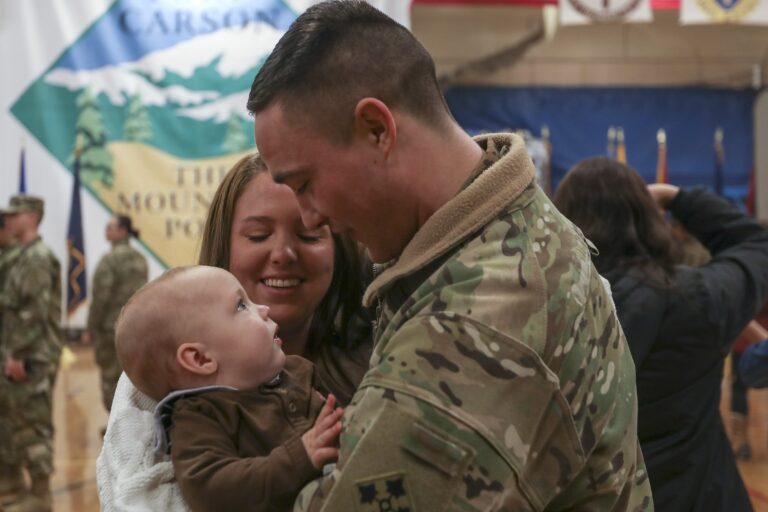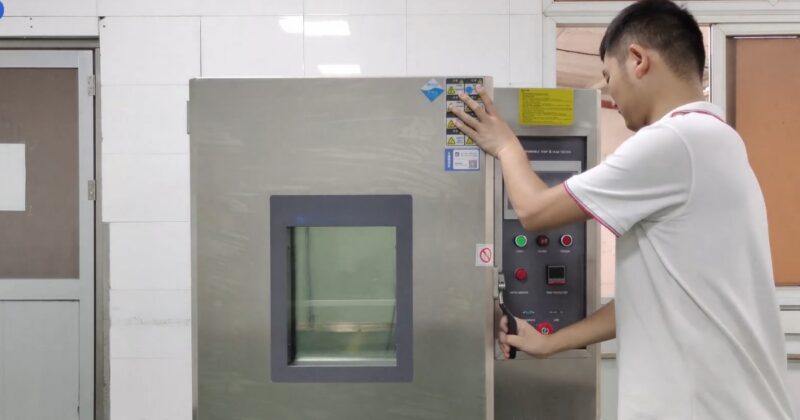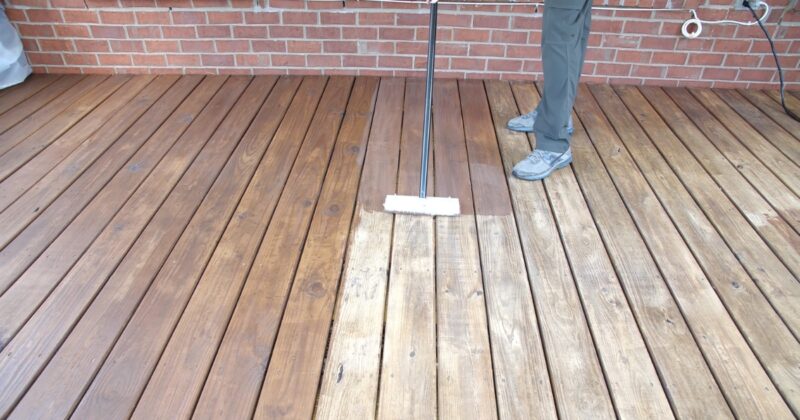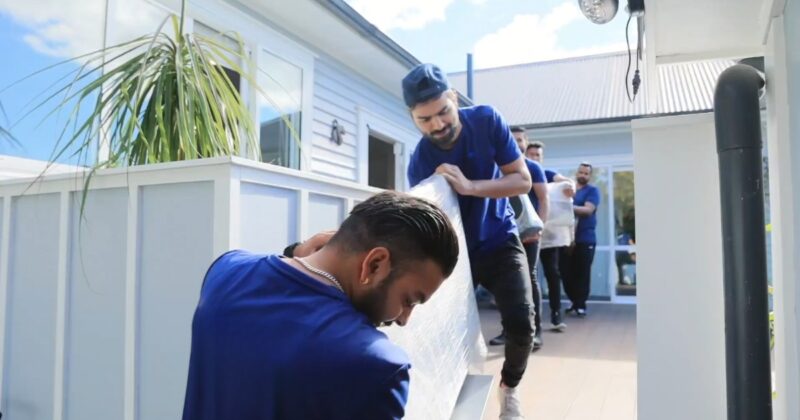Julie fell in love with her western Kansas high school sweetheart and next door neighbor, Kevin Hundertmark. He was a year ahead of her in school and opted for community college after graduation. After a few semesters, though, Kevin decided to try something different.
Courtesy of Lt. Col. Hundertmark \ Julie Hundertmark, with her husband, Kevin, and her family, stand with the U.S. Army Healthcare recruiter who helped her apply for the Health Professions Scholarship Program in 2001.
Not long afterward, Julie was surprised when he showed up at her high school in Garden City to inform her that they needed to break up.
‘At first, he wouldn’t tell me why,” she said. “I finally got him to tell me he had joined the Army. He was worried that I would not want him to join, so he broke up with me so I wouldn’t influence his decision because he knew I wanted to go to college.”
Their relationship has endured.
Through 29 years of deployments, overseas assignments, night school, four children, an Army medical school scholarship and residency, Lt. Col. Julie Hundertmark and Kevin’s relationship and mutual Army careers have not only survived, but thrived.
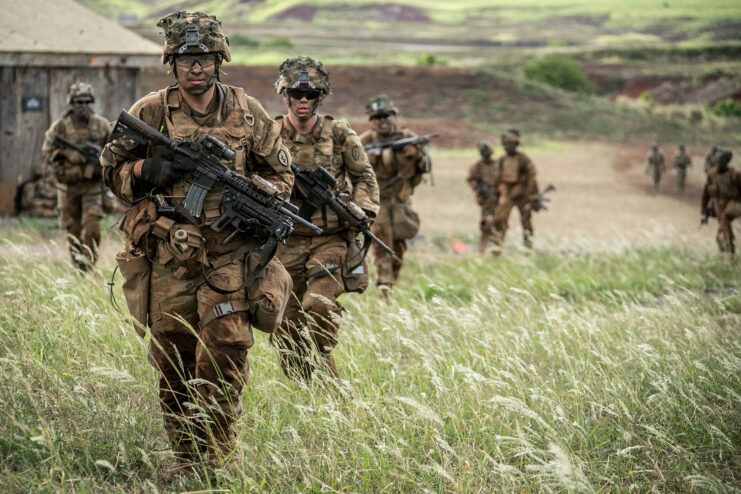
A year into his Army infantry career, Kevin popped the question for the second time — he asked her the first time when he was in boot camp but she refused out of concerns about interrupting her college education. Even though he was thousands of miles away in Germany and she was in college working on her pre-medical requirements, they had missed each other, so they decided to tie the knot.
Julie and Kevin maintained a long-distance relationship for some time, which allowed her to stay and complete both her first and second year of college. Kevin eventually received orders stateside, and they were reunited about the time of their first wedding anniversary. Ecstatic to be together again, and looking forward to the birth of their first child, they enjoyed his leave together back home.
“Thirty days after his arrival back in the States, we drove to Fort Stewart, Georgia, and my husband left me in the car while he went inside to sign in with this unit,” Julie said. “He came out to the car and told me he couldn’t leave his unit because they were locked down. Iraq had just invaded Kuwait. He was assigned to the 24th Infantry Division, a rapid deployment unit, so he wasn’t going anywhere.
“So, me and my eight-month pregnant belly went back to the motel, and I cried my eyes out,” Julie said. “Needless to say, I wasn’t very happy with the Army at that point.”
The Army came through, and leaders were able to give Kevin a temporary assignment loading ships until their daughter was born. About two weeks later, he shipped off to rejoin his unit in Kuwait. She moved back to Kansas with the baby to await his return. That was in September 1990. In April 1991, they were reunited.
Fast forward almost 10 years, they now had four children — two girls and two boys — they were stationed in Germany, and he was at a career decision point. So, they decided to have a family meeting. They lined up their small children on the sofa, and had a discussion as a family.
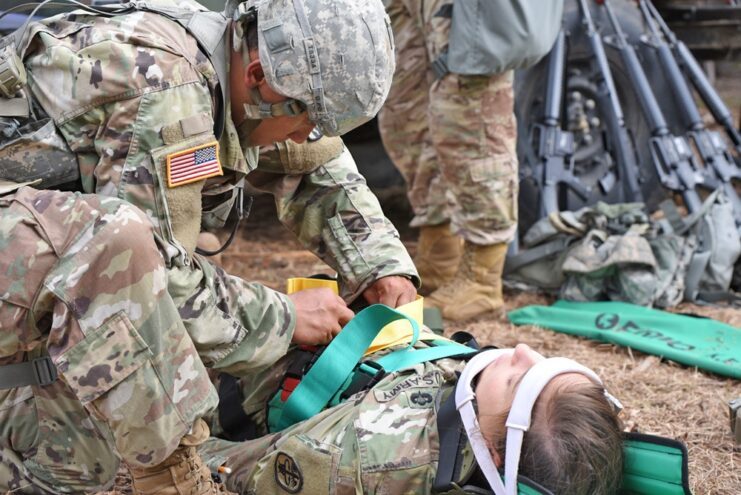
“I had dreamed of doing something in the medical profession since I was a child,” Julie said. “Growing up in a middle class family with no one in the medical profession, I didn’t have anyone to guide me. But my Dad told me I could be anything I wanted to be. I looked up to our family dentist, who was a kind man, very professional, and he and his family lived in a beautiful home. So, at first, I wanted to be a dentist. But after the birth of my first child, my heart was set on becoming a physician who delivered babies.
“I had completed two years of pre-medical requirements by that point, so our courses of action were, he would stay in and finish his 20 years, or he could get out and support me as I finished my pre-medical courses and [applied] to medical school.”
After a lot of heart-to-heart discussion, the decision was made.
“He agreed to get out of the Army for my sake and career,” Julie said.
They moved to Oklahoma City, where Julie enrolled in college, and Kevin began work in a family business owned by some old Army friends.
Shortly after their arrival, the business went bust, and Kevin had to take several jobs to keep the family afloat, carefully arranging his schedule so he could watch the children while Julie attended classes.
Kevin had three different jobs at once, including delivering coffee, processing packages and delivering newspapers, while also serving in the Army Reserves.
Figuring out a way to pay for medical school was an issue they had to confront as Julie neared the end of her pre-medical undergraduate program at the University of Central Oklahoma. She remembered a conversation with an Army pediatrician years earlier, which gave her hope there was a path to a scholarship.

“I was with one of my children at an Army clinic at Fort Irwin, [California], where they were being seen by an Army pediatrician,” she said. “Just in passing conversation, I expressed my desire to be a physician someday. That’s when she told me about the Army’s Health Profession Scholarship Program, which would pay all of my tuition, book costs and provide a monthly stipend. I knew we couldn’t afford medical school on our own, so she showed me a pathway to my dream.”
After some searching for an Army healthcare recruiter, Julie connected with one, applied for scholarship, and was accepted. She entered the University of Oklahoma Health Science Center program in Oklahoma City and graduated in 2005.
July then went on to complete her residency in Family Medicine at Martin Army Community Hospital at Fort Benning, Georgia, graduating in 2008.
Shortly after residency, Julie was sent on her first deployment, arriving at a forward operating base near Mosul, Iraq, later that year. She quickly became a mother figure to the young Army men and women stationed at the FOB, and realized how her family medicine training had set her up for success.
“Because of my skill set, I quickly became the person that got the calls from units because I was the one they looked upon to help with
community needs. ‘Dr. H., we need someone to help us put together a women’s health symposium for the deployed female Soldiers,’ or ‘Dr. H. can you help train the medics on common health concerns you encounter in the clinic?’ or ‘Dr. H., our medics need to keep their EMT certification up-to-date; can you set up a lecture series?’ etc., etc.,” Julie said. “I felt really needed, and I definitely felt like I was fulfilling God’s calling in my life, despite the pain of being separated from my husband and family.”
Army life in the beginning had been difficult but she learned to like it and credited those early experiences as an Army spouse for aiding her frame of reference.
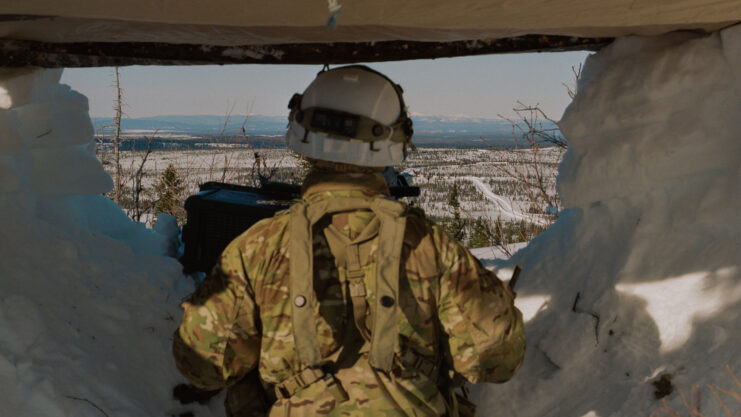
“Being the wife of an infantryman opened my eyes,” she said. “Now that I had become an Army physician, I could have better conversations with young Soldiers and family members, and view things from their perspective, and truly be an advocate for my patients.”
Toward the end of her deployment, she was awakened late one night by someone pounding on the door of her quarters. She immediately thought to herself that there must be a mass casualty incident, and she began to run through life-saving procedures in her mind as she quickly got into uniform before answering the door.
“It was Special Forces Soldiers, who I didn’t recognize,” she said. “They asked me if I was Dr. Hundertmark, which I affirmed. I asked them if it was a mass casualty, and they said no, ‘but we need you to come with us; we need your help delivering a baby.’ I thought to myself, ‘Well, I have been here many months now; how did I miss a pregnant Soldier?’”
Upon entering the patient’s quarters, she instead met an Iraqi civilian, the wife of one of the Iraqi soldiers assisting the U.S. Special Forces. The Iraqi soldier and his wife had been allowed to stay within the safety of the FOB for protection because they were being targeted by Al Qaeda. Many of their relatives had already been slain in retribution for their assistance.
Despite the circumstances facing her, Julie said she felt prepared for the challenge.
“I had done a lot of things while I was deployed, which made me thankful that I was a family physician. Just the ‘cradle to grave’ breadth of my scope of practice helped me in so many areas,” she said. “I kept thinking to myself I had chosen the right profession. I felt thoroughly prepared for this situation.”
Julie said when she arrived to the quarters, she found a woman who was absolutely scared to death.
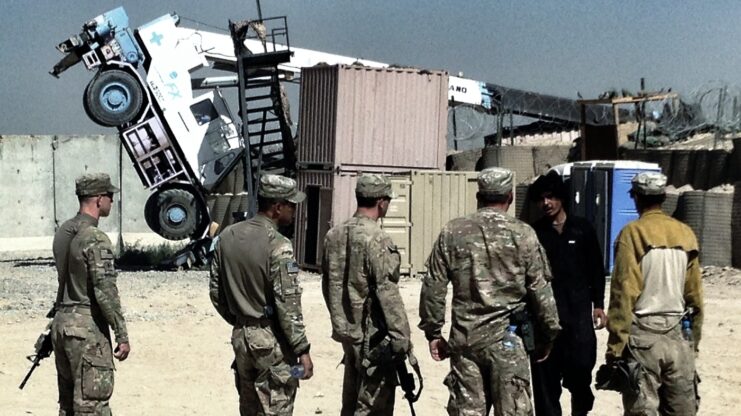
“Through a translator, I learned that she was not sure how far along she was, and that it was her first child. She hadn’t received any healthcare over the past four or five months. She didn’t have any medical records. She thought she was close to her due date, but wasn’t sure,” Julie said. “She was having contractions. I was able to check her and the baby, and reassure her that both she and the baby were okay. It was obvious she was near her due date, if not past it, but we weren’t having a baby that night.”
The reason was Julie discovered there was excess fluid around the baby, which could be dangerous for the child during delivery.
“I was also concerned about her having the baby there in her room. I relayed my concerns to her through the translator, and I will never forget her response,” Julie said. “With tears in her eyes, she said, ‘I would rather die here with my baby, with you trying to help us, safe within these walls, than to go to an Iraqi hospital and die at the hands of Al Qaeda.’”
Over the course of the next few weeks, Julie was able to arrange for diagnostic tests, medicine and monitoring of her condition. The Iraqi woman was able to safely deliver the child in a hospital in the nearby Kurdish area before returning to the FOB with her baby. Julie said she was both elated and relieved.
Julie left Iraq shortly afterward and was reunited with her family at Fort Benning. She was then assigned as the officer in charge of one of the Army’s first clinics designated as a Patient Centered Medical Home, or PCMH. The National Committee for Quality Assurance, a non-profit medical certification organization, describes a PCMH as a model of primary care that is patient-centered, comprehensive, team-based, coordinated and accessible, and takes into consideration a patient’s family, culture, environment and preferences.
Shortly after her assignment to the clinic, Julie was asked to become the champion of the PCMH for the Army in the southern medical region. She found herself working with 53 other clinics also implementing the model.
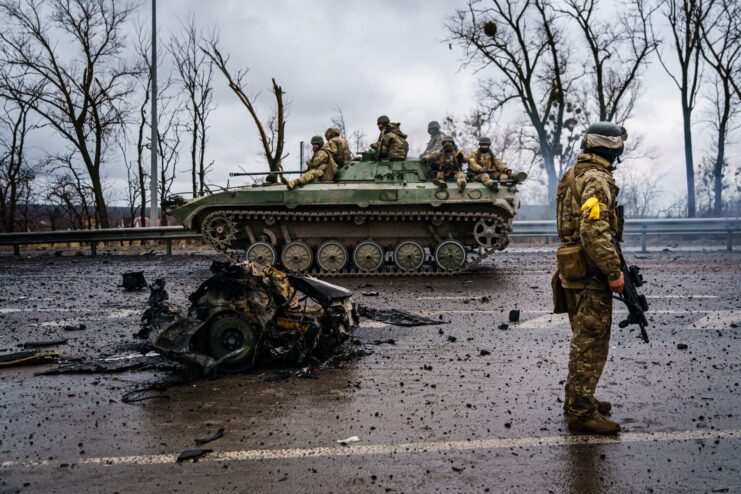
“I got to be at the grassroots level of this initiative and train others,” she said. “It was a privilege implementing this important program and allowed me to continue to focus on advocating for my patients.”
Julie now serves the U. S. Army Medical Recruiting Brigade at Fort Knox as the recruiting integration officer, representing the U. S. Army Medical Corps. She provides direct support to the recruiting mission that fields recruiters across the United States who are searching for the best physicians to serve Soldiers and their Families. The Medical Recruiting Brigade recruits over 1,500 physicians, dentists, nurses, veterinarians and other healthcare professionals each year, and recruits several hundred chaplains and chaplain candidates for Army service.
The physician recruiting mission is especially challenging, with stiff competition from civilian organizations that can offer higher rates of compensation. Julie’s advocacy in dozens of face-to-face encounters each year at national medical conventions and other physician engagements has become key to the recruiting strategy.
“Having a physician on staff does help translate the experience from something that is one-dimensional to a three-dimensional interaction, and gives prospects the real aspects of Army service,” Julie said. “Just being able to talk about what I do and what I love about the Army makes it easier to convince prospects, and makes them want to experience the Army for themselves.”
Lieutenant Col. Edward Mandril, commander of the Medical Recruiting Brigade, said Julie is a force multiplier.
“She spends weeks on the road each year, assisting our recruiters at national conventions, regional and local events, seminars and presentations. She recently was featured as a Main Stage speaker at the American Academy of Family Physicians Residents and Students national conference in Kansas City, Missouri,” Mandril said. “Her earnest testimony about her life in the Army and in Army medicine has influenced hundreds of potential physicians and community partners.”

Julie said she has learned to strike a good balance between being a wife and mother, and an Army physician. As a result, one of her children is following in her footsteps as an Army Health Profession Scholarship Program recipient and future physician; others have plans to serve in the Army or as Army spouses. And her husband, Sgt. 1st Class Kevin Hundertmar, has been able to continue his Army career, serving as a career counselor in Louisville.
Related Posts:
- Army Reserve IMA Program Provides Career Opportunity
- 113th Army Band, Army’s Second Oldest, Prepares for…
- Citibank Takes Over Government Travel Card Program Nov. 30
- ‘Stripes’ Helped Bridge Gap Between Society, Army…
- How Gadgets Can Improve Health and Well-being - The…
- Eco-Friendly Living: How Solar Power Enhances Your…

